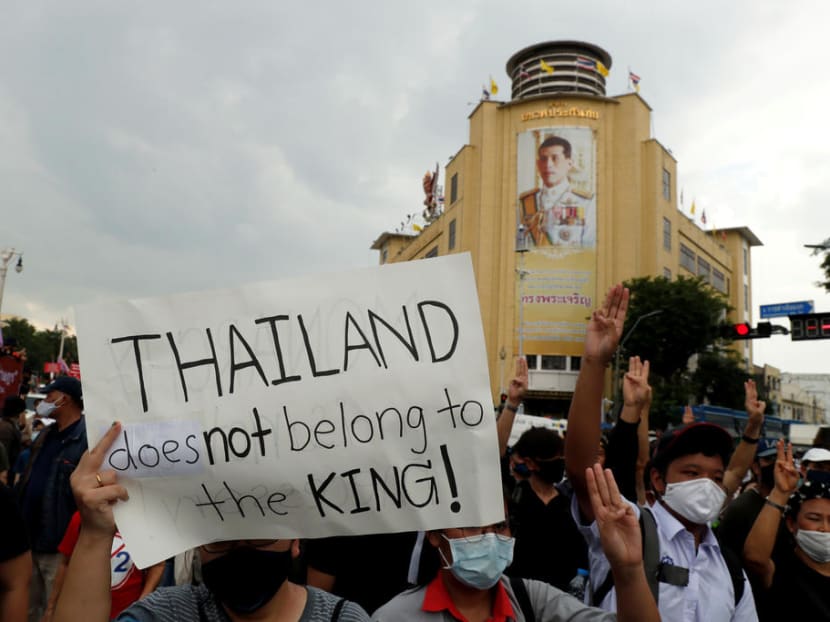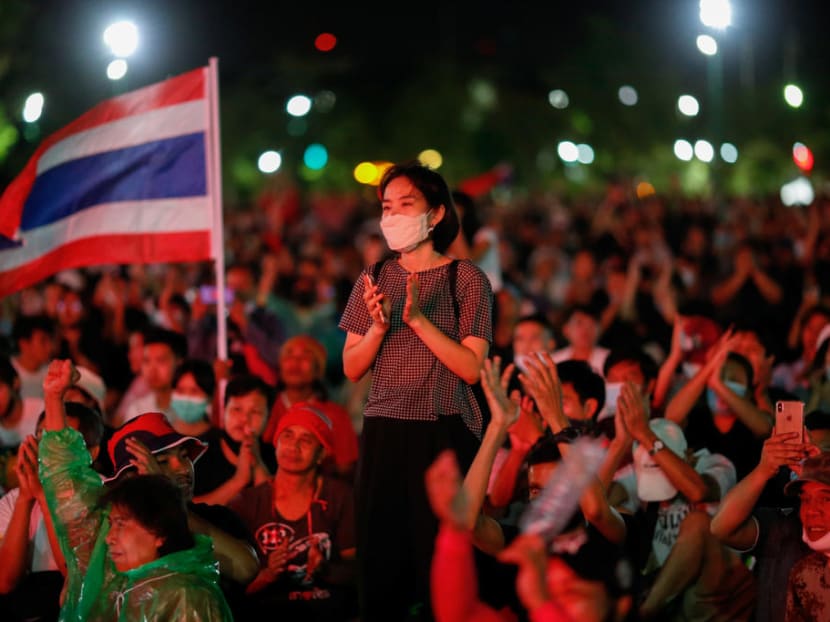Explainer: What the youth-led protest in Thailand is about and the factors fuelling it
SINGAPORE — Over the past three months, Thailand’s youths have been thronging the streets of Bangkok in protest at what they see as a mishandling of the economy by the Government, political suppression and the perceived intransigence of the monarchy.
- Deep-seated dissatisfaction over political leadership and perceived political suppression has led thousands to take the streets
- Experts said that Thai youths, in particular, have been troubled by various political upheavals in recent decades
- They see "no future" and are therefore "reclaiming" what they have lost, the experts said
SINGAPORE — Over the past three months, Thailand’s youths have been thronging the streets of Bangkok in protest at what they see as a mishandling of the economy by the Government, political suppression and the perceived intransigence of the monarchy.
The protests escalated over the last week, with tens of thousands taking the streets in demonstrations held not just in the Thai capital but also in several other towns around the country.
TODAY takes a closer look at how the situation arose, and why youths are driving the movement.
HOW DID IT BEGIN?
In November last year, vocal opposition figure Thanathorn Juangroongruangkit — popular among youths and liberals — was disqualified as a member of Thailand’s Parliament. His Future Forward party — seen as the most vocal party opposing the Government — was then banned by the Thai constitutional court.
This resulted in hundreds taking to the streets of Bangkok on two separate occasions, in December and February, to protest over these decisions.
With Covid-19 picking up speed as 2020 unfolded, Thai authorities imposed a state of emergency to stop the spread of the virus, limiting gatherings and thus halting further protests.
Protests resumed on July 18, with the main organising group, Free Youth, drawing about 2,500 to protest in Bangkok.
Several other protests followed, notably one in August where students at Thammasat University listed 10 demands for reforming the monarchy, including the abolition of the strict lese majeste law against criticising the monarchy, which carries a sentence of up to 15 years’ jail.
In September, tens of thousands again protested at Bangkok’s Thammasat University calling for reforms to the monarchy as well as for the resignation of Thai Prime Minister Prayuth Chan-ocha, a former army commander who came to power in 2014 in a military coup.
Then last Tuesday (Oct 13), protesters scuffled with the police and chanted at King Maha Vajiralongkorn’s passing motorcade to demand the release of 21 protesters arrested earlier that day, leading to at least five more days of protests, which culminated in the enactment of emergency measures by the Government.
King Maha Vajiralongkorn assumed the throne after the death of his father, the revered King Bhumibol Adulyadej, in 2016. Since then, he has consolidated power and wealth in the monarchy.

WHAT ARE THEY PROTESTING AGAINST?
The protesters have three demands — the resignation of Mr Prayuth, a more democratic constitution and reforms to the monarchy.
The protesters charge that Mr Prayuth was returned to power unfairly in last year’s general election because laws had been changed to favour a pro-military party. He had maintained the elections were fair.
Political analyst Thitinan Pongsudhirak from Chulalongkorn University in Thailand told TODAY that of the three demands, the resignation of Mr Prayuth is the “most workable”.
“He has been in office more than six years with poor results,” said Dr Thitinan. “A new constitution and monarchy reform can only be broached after this government goes.”
The protesters’ demand for a reformed monarchy — one that acts within the checks and balances of democracy — is particularly controversial given that criticising the monarchy is punishable by the lese majeste laws, which have been used numerous times over the years.
Other political experts told TODAY that open criticism of the monarchy is an “unprecedented” phenomenon.
Dr Paul Chambers from the Centre of Asean Community Studies at Naresuan University in Thailand said that by calling for reform of the monarchy, the students have “let the genie out of the bottle”.
“From now on, calls to reform the Thai monarchy will be something that can be talked about openly.”
Another factor that could have led to the widespread protest is the economic frustrations brought about by the Covid-19 pandemic.
Dr Ayako Toyama from the Graduate School of Humanities and Social Sciences at the University of Tsukuba in Japan said that while the government has succeeded in curbing Covid-19 infection rates, it has failed to come up with an “effective remedy for those in financial distress”.
“The problem of poverty caused by (Covid-19) is one of the factors behind this anti-government movement,” said Dr Toyama, who carries out research on the democratisation of Thailand.
WHY ARE YOUTHS DRIVING THESE PROTESTS?
Dr Michael Montesano, the coordinator of the Thailand Studies Program at the Iseas-Yusof Ishak Institute in Singapore, said that young Thais have a “greater awareness of the wider world” and are beginning to ask themselves why their country must be “different in ways that they find undesirable”.
“They wonder why the military has such a powerful role in Thai politics, they ask why the Thai monarchy does not seem to be like other constitutional monarchies,” said Dr Montesano.
He added that unlike the older generation, younger Thais have no memory of a time when the Thai military faced serious security threats such as during the Cold War era, and when the monarchy played a role in fostering national unity.
Instead, the Thai youth had been through two coups in 2006 and 2014, as well as the 2008 Thai political crisis, which featured a major standoff between political factions known popularly as the “red shirts” and the “yellow shirts”.
Agreeing, Dr Thitinan said: “After so many years of crisis and confrontation, the younger generations — those born after 1980 — are seeing that Thailand has no future ahead, and therefore they are demanding and reclaiming the future they have lost to Thai politics and local confrontation.”
He added that the way youths utilise social media has an important role to play as well, with thousands of young protesters coordinating their rallies on platforms such as Twitter and Facebook, not just centred in Bangkok but in dozens of cities across the nation.
“Social media has empowered them… enabled them to organise and coordinate between the cyber world and the real world on the ground,” he said.
HOW HAS THE THAI GOVERNMENT RESPONDED SO FAR?
In response to the demands, the government on Oct 15 enacted emergency measures including a ban on gatherings of five or more people. In defiance of this order, thousands took to the streets. On Oct 16, riot police fired water cannons at protesters, a move criticised by human rights groups.
In response to the protesters’ demands, Mr Prayuth has told reporters that he will not be quitting, warning Thais not to violate the emergency measures.
Experts said that it is very unlikely that all the demands of the protesters will be met.
“The protesters' demands to reform the monarchy are currently too progressive for Thailand's political mainstream,” said Dr Chambers.
“The government will make a few token reforms to give the general public the impression that it is accommodative to mild change but (that it) does not surrender to protests.”












